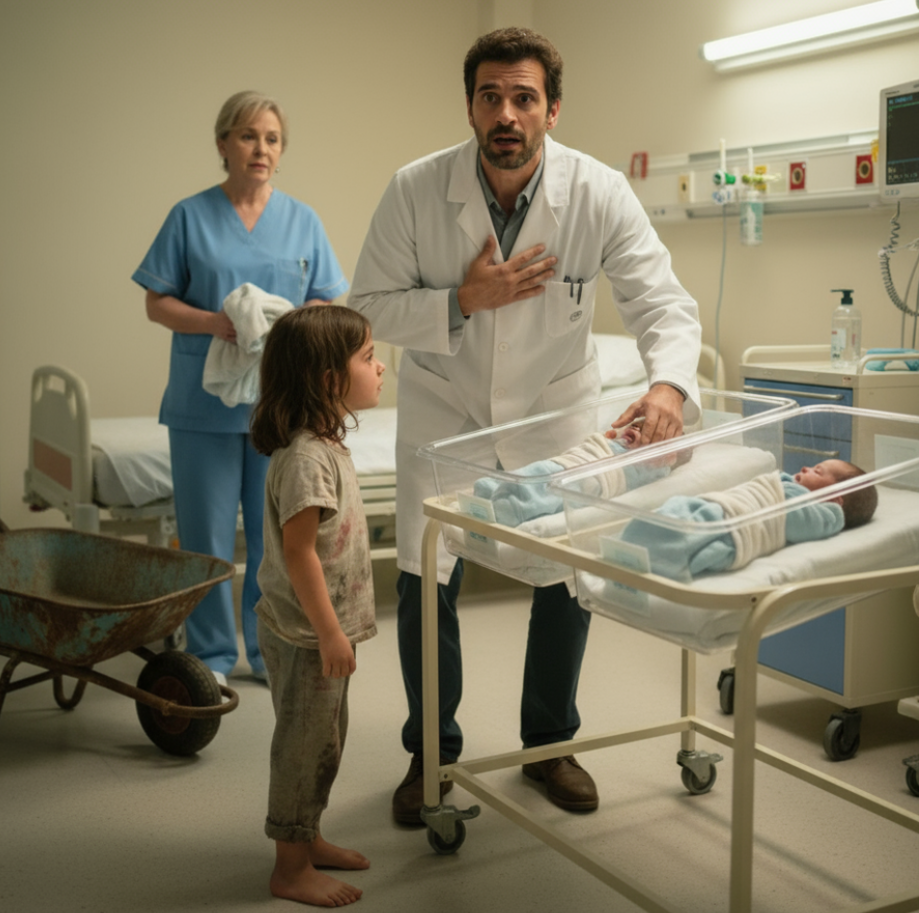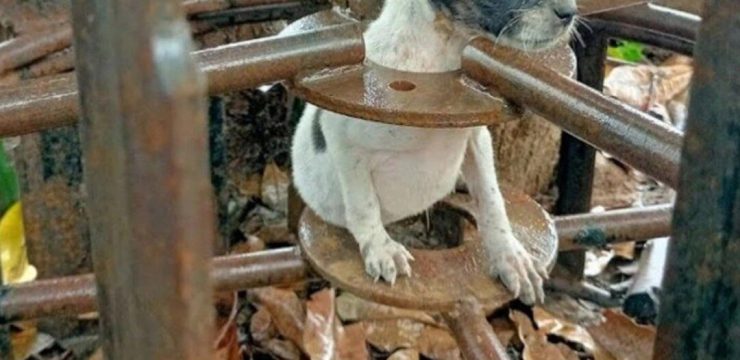The emergency room at St. Mary’s County Hospital had seen plenty of hectic days, but nothing prepared the staff for what happened that quiet morning. When the automatic doors slid open, a triage nurse looked up—and froze. A little girl, no older than seven, was pushing a battered, squeaky wheelbarrow through the entrance. Inside, wrapped in a thin blanket, lay two newborn babies. Their tiny chests rose and fell, but their faces were pale from exhaustion and cold.

The girl’s hair stuck to her forehead, her clothes were torn, and her voice shook as she forced out the words, “Please… my mom’s been sleeping for three days. I need someone to help.”
For a moment, the entire emergency department fell silent, as if the air itself paused. Then, all at once, the room burst into motion. Nurses rushed forward, doctors shouted for warm blankets, and a stretcher appeared from down the hall. Just as help reached her, the little girl’s legs buckled, and she fainted onto the tile floor.
Hours later, she woke up to bright white lights and the faint beeping of monitors. A gentle voice beside her said softly, “Hey there, sweetheart. You’re safe now.”
It was Nurse Helen Brooks, a woman whose calm presence had steadied countless patients over the years. Her kind eyes softened even further when the girl blinked up at her.
The little girl sat up too fast. “Where are my brothers? Where’s Micah and Emma?”
“They’re right here, Lily,” Helen said, pointing to two bassinets beside the bed. “They’re warm, safe, and the doctors are taking excellent care of them.”
A shaky breath escaped Lily, half sob and half relief.
“You brought them just in time,” Helen added. “You saved them.”
A few hours later, Dr. Michael Harris, the pediatrician on call, entered the room with Dana Lee, a social worker carrying a folder thick with forms.
“Hi, Lily,” Dr. Harris said gently. “We need to ask a few questions so we can help your mom. That’s all we want.”
Lily hugged her knees tightly. “Are you going to separate us?”
Dr. Harris crouched down until they were eye-to-eye. “No one is separating anyone. We just need to understand what happened at home.”
Lily swallowed. “Is someone helping my mom wake up?”
Dana and Dr. Harris exchanged a quiet, heavy look.
“There are people at your house right now,” Dana said softly. “They’re doing everything they can for her.”
Lily nodded slowly, then pulled a small, crumpled piece of paper from her pocket. “This is our house,” she whispered. Drawn in shaky crayon strokes was a blue house, a tall tree, and the number 44 written unevenly across the page.
“I put the number in my pocket so I wouldn’t forget the way back.”
Dr. Harris felt his throat tighten. “Lily, how far did you walk with the babies?”

She thought. “Until the sun got tired and the stars came out.”
Later that evening, Officer Daniel Cole and Detective James Rowe followed the drawn map down a rural dirt road outside town. There they found it—a small blue house with a broken fence, quiet under the fading sky. Inside, everything told a story of struggle and determination. Empty formula cans sat on the counter. Clean bottles were lined neatly to dry. A feeding chart hung on the fridge, covered in notes written in a child’s handwriting.
In the bedroom, they found a woman—Anna Maren, 28—unconscious but alive. Damp towels, tiny spoons, and half-filled glasses of water sat beside her bed.
“She tried to take care of everyone,” Rowe murmured.
“No,” Cole replied. “Her daughter did.”
Back at the hospital, the staff worked tirelessly. Dr. Harris reviewed Anna’s condition: severe dehydration, malnutrition, and complications linked to untreated postpartum depression. “If Lily hadn’t kept giving her water,” he said quietly, “she wouldn’t have made it.”
The next morning, when Lily woke again, Helen was sitting beside her. “Your mom’s in another hospital,” she said gently. “The doctors helped her wake up.”
“She’s awake?” Lily whispered.
“Yes,” Helen smiled. “And she said your name.”
Lily’s eyes filled. “I tried to tell her stories and give her water like she showed me for the babies.”
“And you did everything right,” Helen said, squeezing her hand. “You saved all of them.”
That afternoon, child psychologist Dr. Raquel Stone arrived with a small box of dolls. “Can you show me how a normal day looked at home?” she asked.
Lily placed the dolls gently. “On good days, Mom sang while she fed Micah and Emma. But sometimes she got too tired. I kept things quiet so she could rest.”
Dr. Stone noticed how Lily placed her own doll between the mother and the babies—a small protector holding the family together.
“Your mom was right,” the doctor whispered. “You really do have an old soul.”
As days passed, Anna’s condition improved, but she needed months of rehabilitation. The children needed a place to stay together. That night, Helen lay awake thinking about the three siblings. Her house had been quiet since her husband passed, and now she couldn’t shake the memory of Lily’s courage.
By morning, she had made her decision.
She stepped into Dr. Harris’s office. “My foster caregiver certification is still active,” she said. “I want to take Lily and the twins home with me.”
The doctor paused. “That’s a big responsibility, Helen.”
“I know,” she answered softly. “But they need each other. And maybe… I need them too.”
A week later, Lily moved into Helen’s cozy home. The guest room was decorated with bright bedding and a small art desk. Across the hall, the twins slept peacefully in a warm nursery.
At first, Lily barely slept, checking on the babies again and again. Helen would find her in the nursery humming softly.
One night, Helen said gently, “Your mom is getting stronger every day.”
“When can I see her?”
“Very soon,” Helen promised. “She’ll be so proud of you.”
When spring arrived, Lily finally visited her mother at Willow Creek Rehabilitation Center. Standing beneath blooming cherry blossoms, Anna lifted her arms just in time to catch her daughter.
“My brave girl,” she whispered. “You kept your promise.”
“I took care of Micah and Emma,” Lily said softly.
“And you saved me too,” Anna replied.
Months later, thanks to a new county support program inspired by their story, Anna moved into a stable home near both the hospital and Helen. Their families stayed connected, woven together through love and resilience.
And as Lily sketched a picture of their journey—from their blue house to the hospital to their new beginning—she included a small wheelbarrow in the corner. Not as a symbol of hardship, but as a reminder of the strength that carried them forward.
Note: This story is a work of fiction inspired by real events. Names, characters, locations, and specific details have been changed for privacy and creative purposes. Any resemblance to actual people, living or deceased, or to real situations is purely coincidental. The author and publisher make no claims about the accuracy of events depicted and assume no responsibility for how the story is interpreted or used. All images included are for illustration purposes only.





